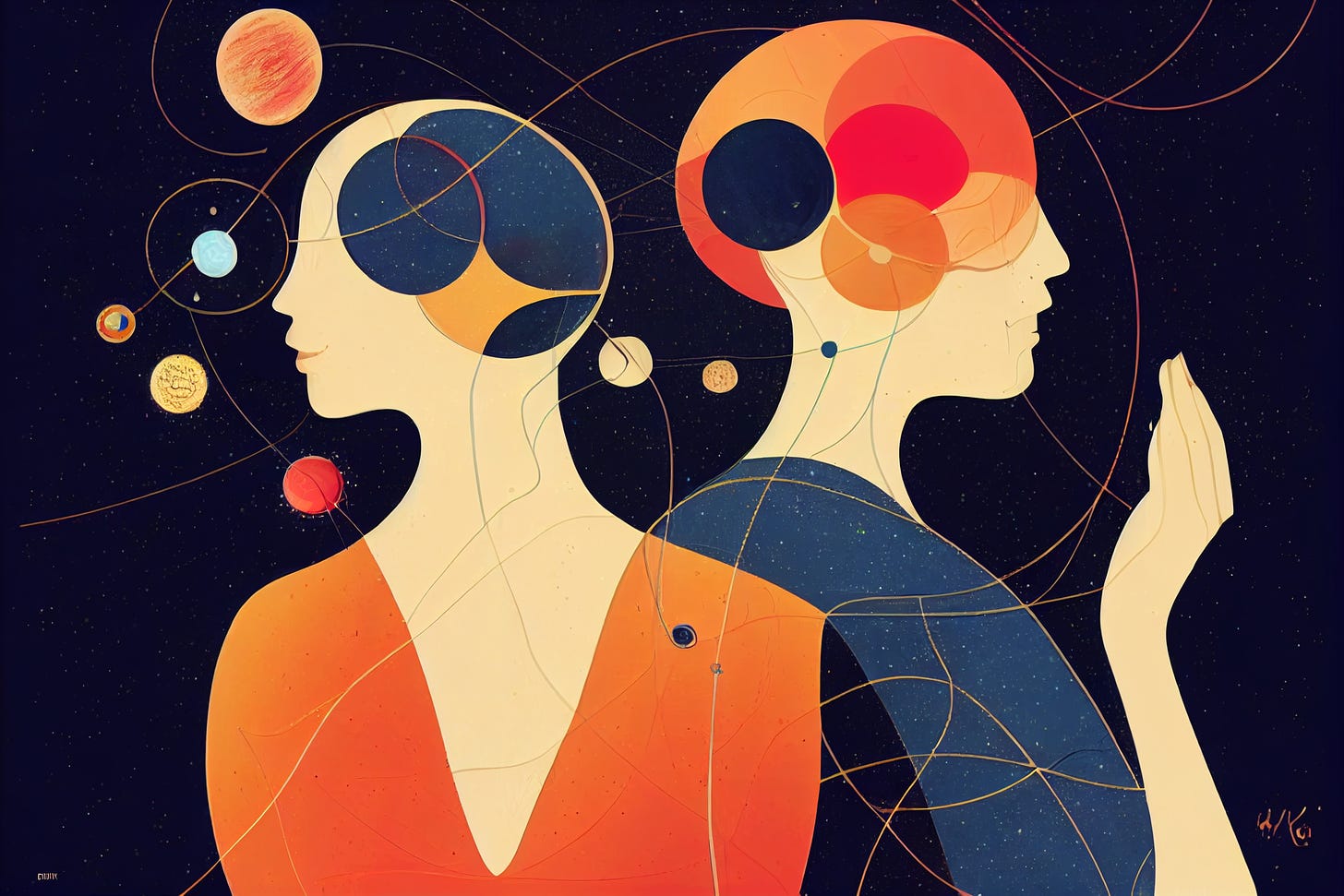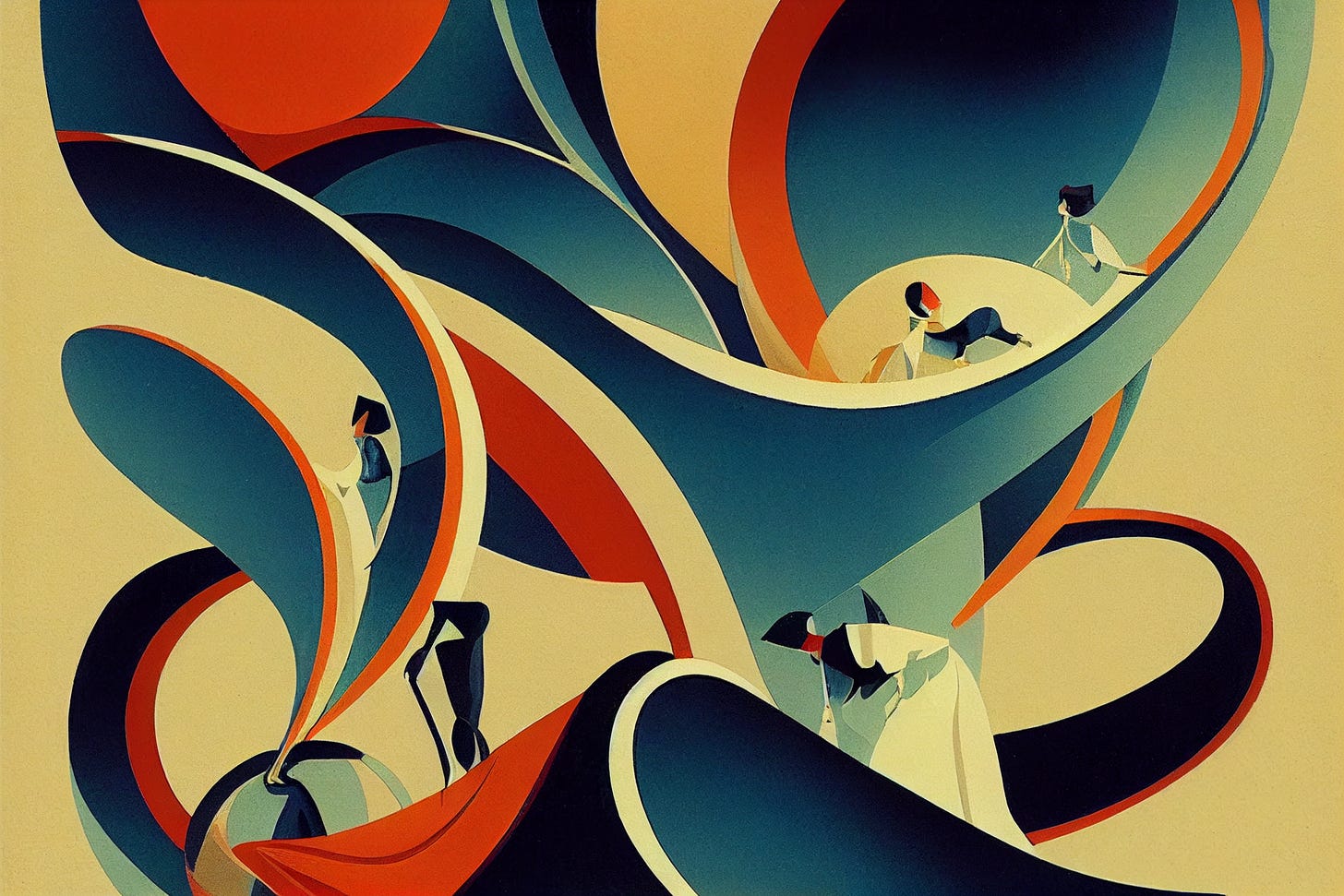Exploring Reality with Both Hemispheres
Thinking strategies for assessing the new, strange, and unfamiliar
Our world is grappling with the constant and increasing friction between the linear, scientific, intellectual, precise, statistical modes of thinking and the indirect, organic, intuitive, fuzzy, embodied modes of perception. Unfortunately, the former is generally derisively dismissive of the latter and the latter transcendently avoidant of the former. Both sides fervently claim that their way is the way, and that the other is shrouded in darkness, ignorant of the truth, deluded, and so on and so forth.
That's interesting, isn't it?
This divide is as fundamental as the left brain/right brain split. As in, it's mostly a false premise. In actuality, each hemisphere of the brain shares responsibility for various tasks but differ in their particular strengths, and there are individual differences in hemispheric specialization between people. "It takes two hemispheres to be logical -- or to be creative." I believe that the relationship between modalities of thinking and perception are exactly the same: you need both!
I spend a lot of time thinking about slippery topics which are considered fundamentally wrong, pseudoscientific, or fringe. As it turns out, the subtle modalities which require a bit of a just-go-with-it-for-a-second mindset do in fact, go many fascinating and valuable places which can inform and support our daily lives when we are brave enough to depart from the familiar landscape of rational thought. However, there are dragons here. When we venture out of a habitual and deeply internalized worldview, we tend to examine everything in contrast to where we came from. The recently religiously traumatized ex-Catholic tends to import (for instance) an underlying dread of hellfire punishment and original sin, while the hardcore ex-materialist nihilist tends to import (for instance) an insistence on meaninglessness and knee-jerk skepticism.
Unless we experience things which challenge the status quo of consensus reality, we tend to take on the overt frames that family and culture hand us. Allow me some projection: for most of my readers, I expect that linear, rational thought couched in the safe aura of statistically-backed studies and research (more often cited than read), will be most familiar. Add a teaspoon of ambiently or explicitly socialized moral values from your loudest local religious institution and a pinch of unnerving experiences hinting at something more mysterious and complicated going on to taste. To that end, I'm mostly interested in exploring reality from the woo side of things: the wiggly, highly anecdotal, deeply subjective, and difficult-to-pin-down world of subtle and not-so-subtle psychism and consciousness.
These include--to name a few things--world events affecting quantum random number generators, confirmed evidence matching past life memories, the inexplicable relevance of astrology to our personal lives, the uncanny accuracy of divination tools such as the tarot, the "super placebo" effect and its relationship to magic, and so on. These can be incredibly difficult to nail down, but if we don't withhold judgment for long enough, we never get beyond what seems like just a placebo effect or confirmation bias. Frequently, those sorts of experiences turn out to be the bottom rung of verifiable spooky, magical occurrences. That being said, even someone whose entire life has been one personal Burning Man might benefit here, since most of how I navigate reality is not particularly dependent on the actual content being considered.
So, on with it. How do we navigate new perspectives and ideas, especially ones which directly contradict and conflict with what we believe to be true? How do we hold the entire universe in our minds without losing them? For myself, I utilize a number of heuristics, or loosely defined mental shortcuts and strategies which can apply to a wide range of problems. I'd like to share some of them with you here.
Heuristics
Fun and flexibility - I like to say that it's called woo because it's fun! If we're exploring reality, hopefully it also entertains us! There's a lot to learn and a lot to know, and it requires us to be flexible in thought. Play with ideas; juggle them, make them dance, make them kiss. Don't be too precious about any one idea, no matter what it might imply. Find a train of thought boring? Toss it out! If it's important, it'll come knocking again. Invite ideas back in. Make up weird ones. Consider them with increasing levels of rigor until you find where they stop being useful. Every now and then you'll find an idea never stops being useful. Treasure it, but beware of turning everything into nails begging for that particular hammer.
Suspension of disbelief - When it comes to woo topics, suspension of disbelief is often a prerequisite. That doesn't mean blind belief! It simply means the willingness to ask the inner inquisitioner to not pass judgment for a moment, and allow a heretical thought to pass. Skeptics sometimes describe their reticence to engage with woo as "a slippery slope", as if by merely thinking about crystals would create an irresistible draw to put on shawls, gemstone rings, and gush about auras. (This somehow manages to combine an almost superstitious aversion with an implicit judgment on conventionally feminine-coded aesthetics and interests.) Really, the territory of woo is more like a jungle: you can take a step off concrete pavement and into the jungle, and then take that foot right back out. But the deeper you go, the wilder and more unfamiliar it gets, and the harder it becomes to extract yourself. So it goes with any reality tunnel.
One white crow - "If you wish to upset the law that all crows are black, it is enough if you prove that one crow is white." William James. When confronted with an instance of something weird, I must pay attention. It doesn't matter how outlandish it is or inconvenient for me to reckon with my existing worldview: if I see something I cannot explain, I must rework my entire comprehension to fit the new reality I've witnessed. Now, I may not be convinced that what I saw was anything at all; but if the white crows start piling up, I have to pay attention. Rare evidence of inexplicable happenings such as highly difficult-to-fake evidence of past-life memories are essential, and must be reckoned with.
Pragmatism and connection with material life - At the end of the day, we all have physical bodies and material lives and finite timespans on this earth. If none of this means anything as it relates to the lives we actually live and the people we are, what's the point? Wandering into the void is fun, but it should also inform the big picture of what we're doing here and who we truly are. Keeping these ideas connected to human beings at human levels of consciousness and existence both helps keep myself grounded, as well as root my experiences in the direct material reality around me.
Take your phenomenology seriously - One of my mantras. "Phenomenology" is the stuff you experience, both within and without. Thoughts, feelings, intuitions, happenings, unexpected experiences, odd sensations. It boils down to the idea that the body can speak in its own language, and the mind does too, if we let it. But the experience is worth having and paying attention to, intrinsically, because it's our experience. Be here now and all that jazz. It also means not dismissing, gaslighting, or judging ourselves about the experiences we're having, the thoughts which may arise, or the unexplainable intuitions we get. Encounter your experience without the intermediary layer of culture's expectations of you. I write about this more in my essay Around Here We Take Our Phenomenology Seriously.
Notice reactivity and disposition - Do you find yourself reacting strongly to particular ideas? Why? Ideas themselves are neutral, so reactions we have to them can be indications that we may not be able to assess the idea neutrally. This doesn't mean that we should disqualify ourselves, but rather that we should go slowly and thoughtfully, taking extra time to pay attention to our inner world as we process information. Beyond pure reactivity, it's important to know your own disposition and temperament. Do you tend to value concepts along aesthetic, pragmatic, emotional, societal lines? Something else? Do you opt for simplicity or thrive in complexity? Does it need to feel "spiritual", or does it need to not feel that way? Why? Does it feel fundamental, or is it learned? Asking ourselves these sorts of questions can help us know when we are over-applying our own natures, helping keep a bigger and more comprehensive picture in mind.
Imagine courageously - When playing with ideas, engage the imagination. What would it mean if some concept were true? What would it imply? What else would it require to be true? What would it invalidate? What could you extrapolate from it being true? How far can you go? Can you go even further than that? (Remember to come back to home base.) Using imagination to go to truly outlandish places can require courage, especially if you don't let your idle imagining mind play much. It's all "just in your head"--have fun with it. Every idea is a heresy to someone.
Hold on tightly, let go lightly - Frequently said in the entertainment world, this means sticking to one's direction firmly but being able to move on from it quickly in light of new guidance, feedback, or information. As applied to exploring reality, we should hold on firmly to our observations and experiences, but let go of the background explanations and presumptions of how they work easily in face of invalidating information. Conclusions are the mind-killer.
Perception, not victory - It can be easy to get caught up in imperialist modes of discourse where the goal is to take no prisoners and decimate the enemy. But the desire to be right and to win is also what leads to sloppy, imperceptive, and motivated thinking patterns. Strive for neutrality whenever possible to see most clearly. We can question ideas and experiences without interrogating them--especially those of others'. The axe forgets, but the tree remembers. Remembering to play helps.
Respect others' intelligence and experience - Given that our ancestors managed to survive long enough to give birth to us, assume they were not in fact ignorant or clueless. We have an incredibly partial picture of history, and plenty of evidence that suggested the ancients may have known far more than we typically give them credit for, and may have even known more than us about subjects we've long forgotten. Let's also assume that everyone in between had some pretty good ideas, hunches, and perhaps divine revelations or inexplicable bursts of inspiration. Let's also assume that our friends, colleagues, professional competitors, and outright enemies all have some pretty great ideas too. In general, presume good faith unless you have good reason to suspect otherwise.
Enough qualitative data becomes quantitative data - Individual experiences need to be considered thoughtfully, but an aggregate of individual experiences moves from anecdotes to data which can be analyzed in aggregate and have conclusions drawn. Any data reported from a human being's personal experience is subjective, but by drawing connections and similarities (and important dissimilarities) between those experiences, you can find the consistent throughlines which paint a bigger picture. Places where humans' interest persists over millennia are indicators that something is going on. Confluences of fascination are strong hints. Debates which have lasted for a long time have lasted so long for a reason.
Question foundations - Every now and then, you should shake the house to make sure it still doesn't budge. What fundamental ideas do you rely on without having lived the experience, read the study or double-checked the actual translation from Ancient Greek? Many fundamental ideas are fundamental because they're good and true; but sometimes, they turn out to be vapor, or only good and true in certain circumstances or for certain people (religions, nations) at certain stages in life. If you can rock the boat, you need a bigger boat.
Accept ambiguity - When evaluating ideas which cannot be easily demonstrated in lived experience, much of the time things are simply going to be too ambiguous to measure or study. A single experience could be the beginning of a pattern, a new cycle, or never happen again. If we don't allow ourselves to contemplate or make meaning of ambiguous experiences, there's little left to actually say about our lives from our own perspectives. If you don't know what to do with an experience or idea, hold it in suspension and nonjudgment until it touches something you do know.
Metaphysics should follow physics - Ideally, theory and conceptualization should come after the observation of the new and unusual. The rare evidence of inexplicable happenings are essential and define what is actually possible (and what is no longer impossible). Consciousness topics frequently tend to have a bit of a catch-22, where it can be difficult to open the mind up to new experiences without exploring the conceptual ideas behind why or how they might happen in the first place. When this happens, look for consistency and internal coherence. Metaphysics should ideally explain as much as possible, leaving no white crow uncounted and leaving no exceptions which prove any rules. They should connect to lived reality. Is it a brain-in-jar thought, connected to nothing, or do the implications of the metaphysics work? Can you follow the logical conclusions of its explanation and get results that help your life out of it?
Identify the shape of an idea - Does this idea have poles? Is it actually just one end of a continuum? A spot within a spectrum? A conceptual field? A fractal? In fact a single point? Somehow, all at the same time? What ideas would counterbalance, oppose, complement, integrate, or click with this one? Does an idea induce reflexivity or recursion, causing our minds to double back on themselves? What does holding the idea do to our perception and thought processes? Do our conclusions allow us to see more or less? We might want either depending on the situation, but we should be conscious of the effects of the ideas we're tangling with.
The bell curves still applies - In any field of knowledge or experience there are charlatans, scammers, and people trying to make a quick buck or hold themselves up as authorities. There tend to be more in woo subjects because of the high degree of discernment required to navigate them, but there also exist inspired, genuine geniuses who have got "the goods", so to speak, as well as people who are so consistently wrong it's worth listening to their opinions and and always doing the opposite. In the middle are a bunch of mostly normal people of varying degrees of experience, wisdom, and knowledge, just like in any other area of interest.
Modes of consciousness and the unspeakable - Does an idea require a completely different mode of consciousness to understand? Is it something which can only be known after an experience which defies language? Is it being hidden intentionally, or is someone trying their best to explain a literally unexplainable idea? If it's truly being occulted on purpose, why? What does it imply that someone (or many someones) would want to keep something hidden away from the eye of every random person to stumble upon it?
Have you tried it? - For all of the discourse and theory and reading, have you tried it? Have you actually tried to predict the future, spun your chakras, cast a spell, attempted telekinesis, paid attention to your personal astrology? Have you tried it more than once? Have you tried it for a year? Have you tried it exactly as much as knowledgeable-seeming people say that you should try it? Nothing beats real experience, and the true empiricist embraces all potential experiences, regardless of what their preexisting metaphysics might say.
Intentional not-knowing - “There are more things in heaven and earth, Horatio, than are dreamt of in your philosophy.” When dealing with the outlandish, unimaginable, and deeply unfamiliar, I say to myself: "I do not know what is possible, and I most certainly do not know what is impossible." Along the same lines, I like to say that "everything exists". That thing that seems impossible? It's possible. That thing nobody seems to care about? Someone cares about it. The types of people that seem to exist? There are so many more. It's hubris to think that I have the whole picture of what's happening or could ever contain reality with my conceptions which are old the moment I formulate them about the fundamental possibility of the ever-changing and shifting reality. The point isn't whether or not any given instance of something existing is literally true, but to persistently and insistently shake loose the most seductive idea that I've got it all figured out.
A handful of truisms - Especially in wooland, several truisms bear themselves out over and over. As above, so below; as below, so above. So within, so without; so without, so within. Tautologies make sense because they are tautologies. Almost something is still almost something. Keep going. Most deep truths are paradoxes, and most paradoxes are a third, more complex thing. Check for babies in the bath. Could a conclusion be correct even if the way someone got there was wrong? In general, identify a set of useful truisms for yourself and get good at using them deftly and with discernment.
That’s all I’ve got for the moment. I’ll reiterate: it’s important to have fun, to stay flexible, and connect foreign concepts to lived experience. Rigor can wait for a long time, but it should always come in at the end. These heuristics can be used in concert and sometimes in opposition. Healthy tensions in the structure of our meta-conceptions are important, keeping us agile. Think of it like mental calisthenics. Fair warning: the more elastic you become, the harder it may be for others to keep up—or you might bend yourself into a pretzel! When overextended, return to the center of your being and breathe.
If you’d like to get exposed to some of the ideas I’ve talked around here, you might be interested in some of these links to my other writing:
My digital garden home where I talk about many strange experiences
A Reluctant Guide to Making Friends with Spirits, a crash course on performing “entity contact”
My Astrology Dice Guide, an accessible divination tool highly amenable to answering pragmatic, predictive, externally verifiable questions
My Guide to Reading Your Own Natal Chart, a detailed guide for learning how to read your own natal chart
If you have any heuristics of your own that you use to navigate the wild world of woo (or slippery ideas in general), I’d love to hear them. You can comment here or tweet at @sadalsvvd on Twitter. Thank you for reading!








This is fantastic.
As a former statistician who one might also call woo - I appreciate this!